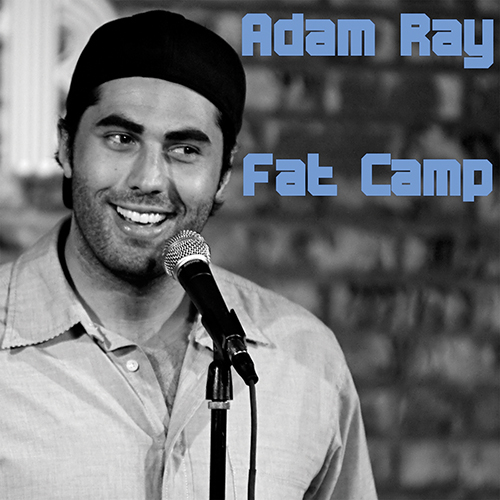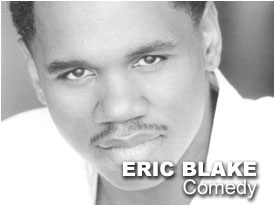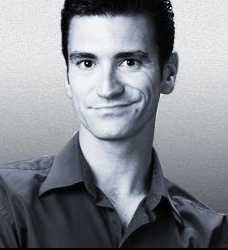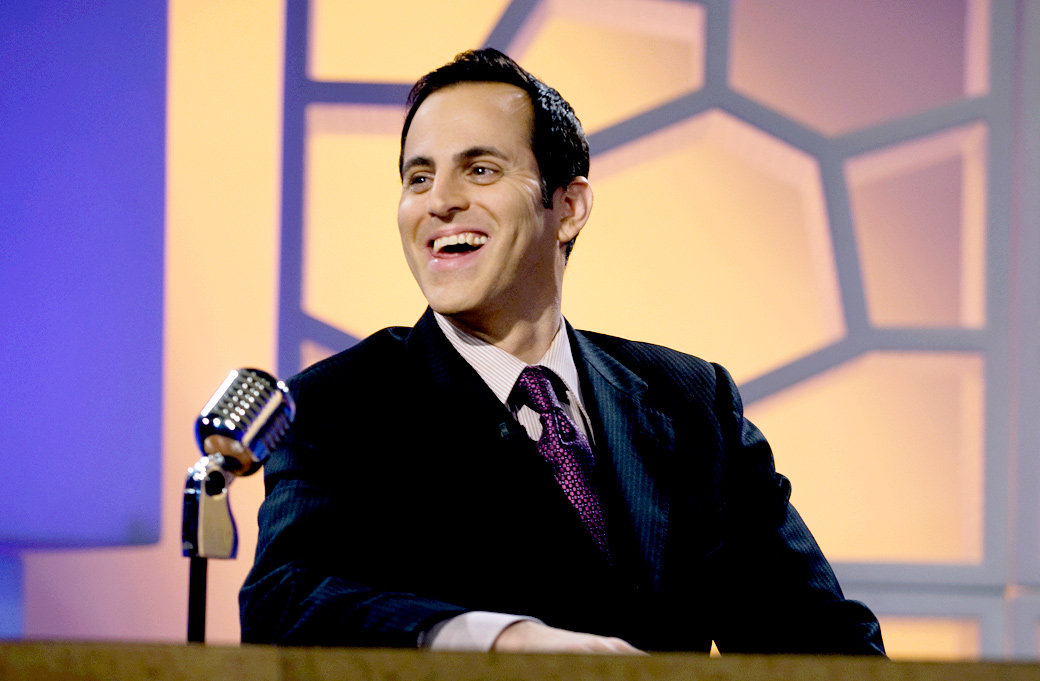Today I’m interviewing Adam Ray. Adam has been touring the country with his standup, opening for acts such as Sinbad, Greg Giraldo, Harland Williams, and Bobby Lee. His TV credits include ABC’s “According to Jim,” and MTV’s “Human Giant.” Adam has created a large online following with the popularity of his web videos that are frequently featured on Funnyordie.com and Youtube. His Kermit the Frog reaction video to “2 girls 1 cup” hit over 5 million views on Youtube.
1. How are you using the internet / social media to promote your career?
 The biggest thing that I’ve used it for is for my videos. When one thing can go viral, it can really do wonders for getting your name out there. I started doing web videos before YouTube really blew up. So I feel like that’s one reason I’m working for FunnyOrDie now and have my videos featured on Digg and College Humor, etc. I started doing video before things blew up. So I started honing on it early, before it became a necessary thing for comedians to do.
The biggest thing that I’ve used it for is for my videos. When one thing can go viral, it can really do wonders for getting your name out there. I started doing web videos before YouTube really blew up. So I feel like that’s one reason I’m working for FunnyOrDie now and have my videos featured on Digg and College Humor, etc. I started doing video before things blew up. So I started honing on it early, before it became a necessary thing for comedians to do.
When I started out, I was putting it up and sending links out, now it’s amazing how many people you can hit with one video. It’s not just you sending it to your people, if people like it, those people send it to their friends, and their friends, and so on.
Video has been the biggest because most comics are actors and when acting is slow you gotta have other things to market yourself and stay creative. You gotta continue to put your name out there and web content is the best way to do that. I’ve had some videos have a lot of success and I’ve had videos that I thought where better and they didn’t do as well. What goes viral is up to universe.
I see comics posting quick little videos for the sake of having videos, some people say ‘if the content is good the quality doesn’t matter” but I disagree. I’ve seen funny stuff on webcam, but if you’re trying to do a sketch, you’ve put some time into writing it and the lighting is bad and video is grainy, it definitely reflects on the comedian.
Having videos helps for shows. I’ve built a good online following cause of the videos and people go to the shows because of the videos. I was at a show and these girls recognized me from the ditzy girl video. They tell their friends, see my standup and subscribe to my YouTube. Ultimately that’s my goal: I want my own show. These networks look online and say, “Well clearly millions of people are following him so that would translate to TV.” You keep doing it and keep building a following. So once stand up and everything else hits you can fuse them together and take over the world.
The internet lets you connect with an audience the way you couldn’t do 15 years ago.
2. “Fat Camp” is your debut album but you had a previous album, “In Your Boobs”, is debut misleading?
“In Your Boobs” was an album of songs I wrote in college. That album is the “I graduated and I need something to do to keep myself busy” project. It took 6 months to create. It was really cool to do and I’ve been doing musical theatre and music my whole life, and I always wanted to do that. I don’t want that on my tombstone though, “Creator of In Your Boobs”. I wanted good music with funny lyrics, some of those songs I wouldn’t have written now though.
And then Fat Camp is stand up. It was my first stand up CD I recorded in San Diego. I started doing stand up in 2001 and did it 20-30 times until 2006. I never made a commitment to doing it until 2007. I don’t think comics should count how long they’ve been doing it until they’ve been doing it consistently 4-5 nights a week, going on the road, really making a commitment to it, etc. I only feel like I’ve been doing it 3.5 years. So “Fat Camp” is basically the first CD, about forty minutes of jokes. It was something I felt I was ready to do. I felt I had enough material I was proud of. A lot of it has changed since recording that but I had people ask me about CDs after shows so I put it out.
3. You have a lot of stand up and sketch videos online, do you think one of these comedy forms lends itself better to internet video than the other?
When I did the Kermit video, I had no idea it’d get 6 million hits and get on all these shows and sites. I had no idea it would happen. A viral sketch or spoof can really blow up and go everywhere, especially if it’s topical. At the same time, Angela Johnson, I just saw her Comedy Central special, and she has her video of her standup of the nail lady character and that really bumped her up. Next thing you know, she’s headlining clubs. I think that happened with her before everyone was doing it. Now you type in “stand up comedy” and get 6,000 videos. I know I see a bunch uploaded on Facebook daily. I think it depends on the timing and what people are looking for, there’s so much out there now, it’s tougher to do. There’s still value in having video of your stand up online, cause people wanna see that. If they can’t make the club, or people who see a sketch of mine, might be curious to see stand up and wanna come out. It definitely doesn’t hurt you to have a little clip of your stand up there to give them a taste if you want them to come out. People like that might pass a clip along to their friends and ask, “do you wanna see this guy with me?” There’s no reason not to take advantage of it and have that stuff accessible to people.
4. Kermit The Frog’s reaction to 2 Girls 1 Cup has gotten over 5 million views, did you think it’d be that popular? How much has the popularity of that clip helped your career? Have there been any negative effects from that?
It was one of those things that was topical, and I saw a bunch of clips of people reacting to the video and I watched the actual one, and I thought it would be really big before it became well known. It was 2007 and we were just now having girls film pooping, you’d think that would be something that would’ve happened already. I guess the country hasn’t evolved that much. I thought, “everyone’s doing reactions of people, how can I make it different?” And I thought, “Nobody’s expecting Kermit” and then I thought, “How can I make it more surprising?”
What really helped out was the YouTube subscribers. It definitely bumped me up a level as far as recognition in the comedy world. Comics knew about it. Joe Rogan messaged me that he liked it. It was cool in that it bumped me up a level in people taking me seriously, which is weird to say cause it was the most beloved character of all time jerkin it to girls shitting on each other. It was funny that people were saying “mad props dude”. It just goes to show you how tough it is to come out with something topical and really have it be different and hitting the issue on a point of view that people haven’t really struck yet. Right now, there’s still comments on it daily and I still get YouTube subscribers from it.
I was concerned about the Henson company contacting me cause I don’t own the rights to it. But if you’re not selling it’s less likely to be an issue. I spliced an Oprah interview to make it look like I was being interviewed with her and they asked me to take it down. But this one there hasn’t been any backlash. If something were to happen, it would’ve happened already. If they ask me to take it down I will, but I’m glad it hasn’t happened yet. It’s like the moon landing, it was a big deal at the time and people won’t forget. I guess I should make a video of Kermit jerkin to Neil Armstrong landing on the moon.
5. iTunes vs regular CDs, what are your thoughts?
I think you’re stupid not go digital. People still use CDs but it’s like when everyone moved from CDs to MP3s and iPods, we turned the corner. I think it’s easier for comics to carry around and sell digital. People spend so much time at their computer anyway. We’re in that digital age, especially with the younger generation. My demographic isn’t 50 and 60 year olds. They download one track and send it to a friend and it’s already named. It’s about being accessible. My CD is gonna be only digital. Maybe my next one I’ll do actual CDs. Maybe even down the line I’ll get hard copies of this one, but right now the digital way is easier and cheaper too.
6. What do you think about posting videos of your stand up performances online?
I think I have one 8 minute video and I’m debating taking it down. I put other stuff up of 3-5 minutes to kinda have and for people to check out. Also, I had to put it up to send the link to a few people. I don’t think having a 20 min set online is ever good. You wanna give people a taste and show them how funny you are in a few minutes. If you show the whole thing, why would they still want to come see you? You’re not leaving anything there.
Stuff on the web doesn’t translate as well in person. There’s something about being there and in the moment, being a part of what’s happening at that time and the energy of the room, it doesn’t translate. You can still see if someone’s funny though. Plus 20 minutes is a long time. The internet attention span is 2-3 minute videos. That’s why I keep mine short. I wish I could chop down 4 minute clips to less. You wanna make it easy to pass around. When they put specials up there, it’s different, when it’s Robin Williams and people know who he is. But not when you’re undiscovered. You don’t wanna put all your shit out there. When people are trying to get to know you, ten or twenty minutes they’ll be in and out and get distracted and won’t give you their full attention. And they’re not giving you a fair assessment for that. They mighta missed half the endings of jokes.
7. How do you think digital tools will change comedy?
It’s already pretty clear what it’s doing. It gives anyone an opportunity to create and market themselves. I know comics and people who don’t have websites and only one video or something. But it’s giving more people opportunities. I think more people have jumped on in trying to make content and get discovered but at the same token, it’s pretty clear what’s good and what’s not. YouTube isn’t the mecca of comedy of producing the biggest stars but you can use it to your advantage to get some instant fame and capitalize on that into bigger things and that’s what some people have done. That’s why I keep doing my videos. Not just to stay fresh but to keep writing and to keep my mind conditioned in that mind set of listening and paying attention to things. You always wanna be in that mind set. You put them out and you don’t know. Every time I put out a video, I get more subscribers. You never know which one will resonate enough that people will send it to ten people instead of two people.
People are trying to capitalize on the web series stuff, there’s a lot of good stuff out there but there’s a lot of shitty stuff out there too. People are paying money to make it look good but the content sucks and vice versa. I know every agency has web divisions now. In the next 5-10 years, once the internet is part of TVs, more integrated, things will probably take another turn, in a good way for comedians.
When I first started out, I was sending out links and I was self conscious about what I was putting out there and look at my stuff and accept whatever comes like “stop sending me these” which actually happened, or something like “that was funny.” And even one of those compliments is enough to keep going.
I’d say be careful and don’t put up crap, cause if people only see one video and don’t like it, they won’t check out another one. At the same time, it’s how I started. I didn’t put up everything I did. Stuff is better quality now, but there’s funny stuff from the old stuff too. The quality and execution has improved the longer I’ve been doing it though. It was a different time though, there weren’t as many people doing it, so I got away with it more. There wasn’t as much competition so I wasn’t being held to a higher standard.
8. How much information do you tend to share on the social networks?
I’m trying to get more of the Twitter thing. I can’t make myself write daily things that I think people actually care about. If I think it’s funny, I’ll spit it out. I mainly use it for shows and videos to let people know about that. I’m not gonna go against it, so I’m trying to do it more. It’s definitely another way to promote and market yourself. People are featured on sites for their tweets. Doing it every fifteen minutes seems tough. I read them and am like, “wow, do you really think people care to know what you’re thinking every ten minutes?” Although there is some funny shit.
In some ways it can be helpful to write a joke. A comic buddy will put stuff out there and if people respond, it’s like a behind the scenes way to test out if people respond to a joke without going on stage. It’s the immediate attention and gratification thing too, it’s like when you perform and do well in stand up. The immediate satisfaction you get from doing well. Twitter is even quicker. If someone retweets or comments on it, it’s immediate gratification. I’m trying to bring myself to do it more, I know it’s helpful but at the same time, I forget about it because my mind isn’t consumed with trying to make my career off of funny anecdotes. When it’s a positive marketing tool, you shouldn’t deny it.
9. What’s your weirdest online experience involving your comedy career?
I did this three part series “Cock Eyed Breakup” and it was featured on the front page of MySpace when that still meant something. It got 500,000 hits or something. The video was about a one night stand, and this girl was cock eyed and I’m trying to break it off with her and its awkward and uncomfortable. And I got messages like, “My daughter is cockeyed, you son of a bitch, how can you make fun of others misfortunes? You’re going straight to hell!” and I messaged them back, “I wasn’t trying to make fun of your daughter, I don’t even know who your daughter is.” This is people that are super sensitive. I don’t think everything is a joke, but you gotta have a sense of humor about most things in life. Of course, it’s easier to say when you don’t have the things you’re joking about I guess.
You also get girls messaging you and wanting you to come perform in certain functions. There’s a church group that wanted me to come and I was like, “Have you seen my videos? They’re not super-Christian-y”.
I’ve also had weird responses. I had a guy at The Improv who hit me up on collaborating. He was like “I wanna make a comedy music video, but I don’t have an idea, or a crew, or anything, but we should collaborate.” He was basically like, “I want you to write, provide a crew and shoot a video and put my name on it with you.”



 Who are the different types of people you will audition for in your career?
Who are the different types of people you will audition for in your career?
